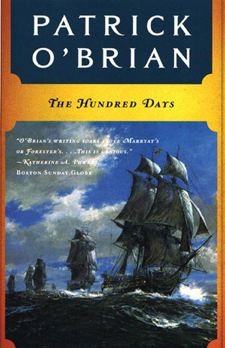The Hundred Days is book nineteen of Patrick O’Brian’s Aubrey-Maturin series and it’s the first book I had to wait for the first time I read the series—and arguably the first book I really read in order, though I had reread the whole of the rest of the series in proper order before it came out. I own it in hardcover. While I was waiting for it, I kept accidentally calling it the “Thousand Days” even though I knew perfectly well that the title was a reference to an actual historical event that’s nevertheless a spoiler for earlier books. I believe it would be a serious mistake to start reading here.
“The Hundred Days” of course refers to Napoleon’s escape from Elba and the time he was again Emperor of France and the powers that had come together to defeat him had to come together to defeat him again. It’s one of the niftiest and most unlikely things that ever happened in history, and if I’d been writing this series, it would have been a thousand days or even more, I’d have had Napoleon win at Waterloo in book nineteen because that’s the sort of thing I find irresistibly cool. I think that reading science fiction and fantasy can warp you for reading books set in the real world, because you get used to there being more potential dimensions so that being held down to the ordinary three can seem constricting. O’Brian let the characters wander out of history into imaginary years, why couldn’t he go that step further and loosen the ropes of history and let a new wind blow? I am disappointed every time this book reaches Waterloo.
I do find The Hundred Days somewhat unsatisfactory, and it’s probably my least favourite book of the series. To begin with, it takes a huge swerve between books, and a swerve for which there isn’t time. We left Jack and Stephen and Diana and Sophie and all the children aboard Surprise at Madeira, with Napoleon escaped and Jack commissioned to gather up the ships and make for Gibraltar. We find them again sailing into Gibraltar harbour, but in the meantime there has been time for A) the families to go home to England B) Diana to kill herself and Mrs Williams driving recklessly on the bridge C) Stephen to go to England and sort out the aftermath and come back. This isn’t physically possible, and unlike every other time where O’Brian fudges time, this is noticeable and visible, because it’s the characters time and because those hundred days are ticking.
Besides the timing of Diana’s death, there’s also the astounding nerve he has of doing something this serious between books. In a roleplaying game I used to play in, we had a rule that if a player wasn’t present their character could be played by somebody else but they couldn’t be killed in the absense of their real player. Most writers seem to adhere to a similar code—major important characters do not die off page. O’Brian blithely disregards this and kills Diana between volumes, and it’s genuinely shocking. I am used to it now, and to a certain extent I like it just because it isn’t what you do and he did it anyway, but I’m not sure it works. Does it work for other people?
He also kills off James Wood, the governer of Sierra Leone, and we learn about it in the same conversation that opens the book. This doesn’t seem significant at the time, but looking at it later it does free both Stephen and Christine (aka the potto-woman) at a stroke, clearing the decks for a new romance. Did O’Brian finally get tired of Diana? He’d clearly been planning it since The Yellow Admiral, where he introduces both Christine and the bridge. It’s interesting that he thinks it’s okay for Jack to remain happily married with a little spouse-breach on the side but Stephen needs his true loves to sigh after and chase—perhaps it’s because Jack is promiscuous and Stephen is romantic?
For most of the book, Jack takes a flotilla around the Mediterranean, detaching ships here and there, fighting now and then. We’re back in the waters of The Ionian Mission and Traitor’s Harbour. As with those books we’re caught up in plots among minor Ottoman functionaries who might take Napoleon’s side rather than with the French directly. There are some charming engagements and some very fine sailing and gunnery, and everyone is very characteristically themselves—except that Stephen spends most of the book unutterably miserable and grief-stricken. Napoleon loses, of course, but not before Jack has taken an excellent prize, and the book ends with the prize money being divided just as the ship sails off in the newly remade peace towards South America.
There’s only one more volume, unfortunately.
Jo Walton is a science fiction and fantasy writer. She’s published two poetry collections and nine novels, most recently Among Others, and if you liked this post you will like it. She reads a lot, and blogs about it here regularly. She comes from Wales but lives in Montreal where the food and books are more varied.










